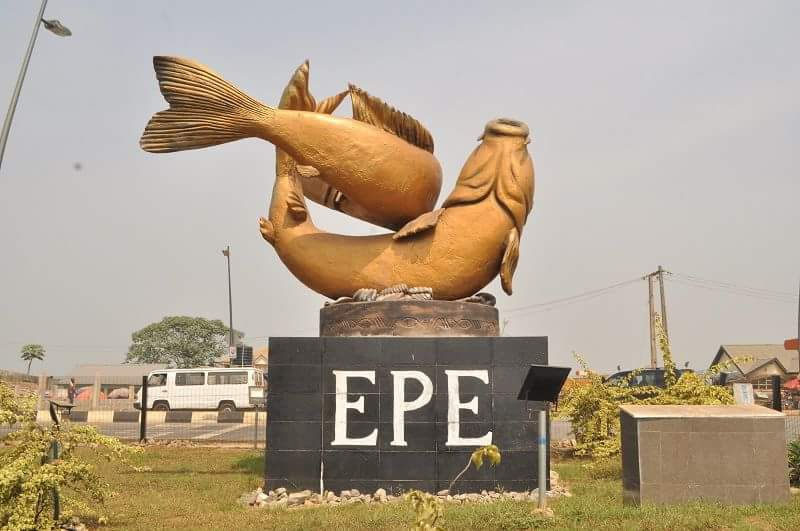Epe: Lagos’ Lagoon City of Heritage, Nature, and Promise
- Nov 6, 2025
- 4 min read

Nestled along the northeastern edge of Lagos State, Epe is a captivating blend of history, culture, and natural beauty. Often referred to as the “Lagoon City,” Epe offers a refreshing escape from the hustle and bustle of Lagos metropolis. With its serene waterfront views, rich traditions, and emerging investment opportunities, Epe is steadily becoming one of Lagos’ most promising destinations for tourism, real estate, and sustainable development. Epe is not just another local government area it is a living testament to the history and spirit of Lagos. Its people are known for their hospitality, deep-rooted culture, and commitment to preserving their environment and traditions while embracing modern growth. From its thriving fish markets and sacred groves to its expanding road networks and hospitality projects, Epe tells a unique story of transformation one that balances heritage with progress.

The history of Epe dates back several centuries. According to local tradition, Epe’s origin is traced to the migrations of early Yoruba settlers who sought fertile land along the lagoon. The town’s name is derived from the “Epe” trees (wild shrubs) that grew in abundance when the first settlers arrived.
Epe’s historical significance is closely tied to the period of inter-tribal conflicts in pre-colonial Nigeria. It became a refuge for various groups and a strategic location for trade due to its proximity to the lagoon and river networks. The town also played a crucial role during the reign of King Kosoko, who, after being exiled from Lagos Island, established Epe as a thriving political and economic center in the mid-19th century. Today, Epe proudly preserves remnants of this heritage through cultural practices, festivals, and monuments that connect its people to their ancestors. The town is also home to ancient shrines, traditional markets, and architectural sites that remind visitors of its rich legacy.
Culture in Epe is deeply woven into daily life. The people celebrate their history and community through colorful festivals that attract visitors from across Lagos and beyond. Among the most prominent is the Kayokayo Festival, which marks the arrival of King Kosoko and the founding of modern Epe. The festival, which features traditional music, dance, boat regattas, and processions, celebrates unity, peace, and progress.
Other festivals like the Ebi Day and Epe Fish Festival highlight the community’s relationship with nature and fishing, which remains a cornerstone of local livelihood. During these celebrations, the town comes alive with vibrant cultural displays, boat racing competitions, and traditional cuisines that showcase Epe’s culinary richness particularly its renowned grilled fish and seafood delicacies. Epe’s traditional leadership, led by the Oloja of Epe, continues to play a key role in preserving these customs while fostering harmony among the town’s diverse ethnic and religious communities.
Epe’s natural landscape is one of its greatest treasures. Surrounded by water, mangroves, and lush vegetation, it offers stunning scenery that appeals to nature lovers, photographers, and adventure seekers. The Epe Lagoon, one of the largest in Lagos State, is the heart of the community’s daily life serving as a source of livelihood, transportation, and recreation.
The lagoon’s calm waters are perfect for boat rides, fishing expeditions, and sunset cruises. Visitors can watch fishermen casting their nets or visit small riverside settlements where traditional canoe-making and fish drying are still practiced.
Epe also boasts of ecotourism sites such as the Epe Mangrove Conservation Zone and Agbowa Forest Reserve, which are vital for biodiversity conservation and environmental education. The combination of wildlife, wetlands, and waterways positions Epe as a leading destination for sustainable tourism in Lagos.
For travelers seeking relaxation, the Epe Marina Resort offers a serene environment for leisure, picnics, and family outings. Plans are underway to develop the area further into a world-class tourism corridor that will connect Epe with Lekki, Ibeju, and the wider Lagos tourism network.

Epe’s rise as an emerging urban hub is no coincidence it is the result of deliberate planning and the region’s natural advantages. With its strategic location connecting Lagos to Ogun and Ondo States, Epe is positioned to become a major commercial gateway for both domestic and international trade.
Tourism, agriculture, and real estate are expected to remain the key drivers of growth. Plans to develop eco-resorts, waterfront estates, and cultural heritage parks will further position Epe as a prime destination for sustainable tourism and investment. Moreover, as part of the Lagos Smart City Project, Epe is set to benefit from digital transformation and infrastructure upgrades that will enhance transportation, security, and environmental management. Epe represents the perfect balance between Lagos’ vibrant modernity and its deep-rooted traditions.
It is a city where fishermen still cast their nets into the lagoon at dawn, where traders welcome customers with smiles at colorful markets, and where young entrepreneurs are building the future with innovation and creativity.
For visitors, Epe offers more than just sights it offers an experience of authenticity, peace, and discovery. For investors, it offers vast opportunities in real estate, tourism, and commerce. And for Lagos State, Epe symbolizes the future a city of balance, sustainability, and limitless potential. Indeed, discovering Epe is discovering Lagos anew: a place where the rhythm of the lagoon meets the heartbeat of progress.






Comments